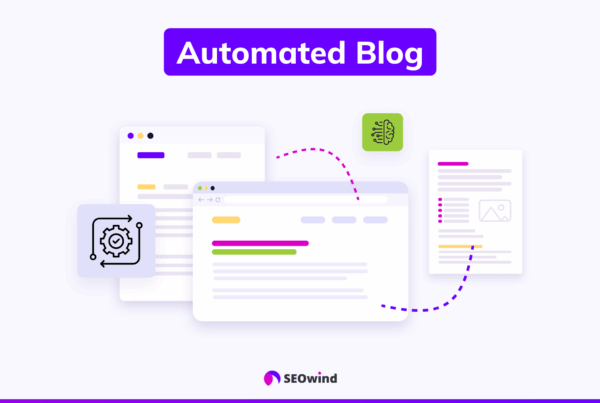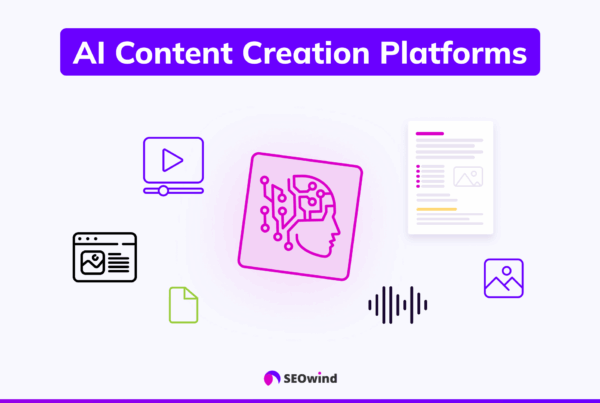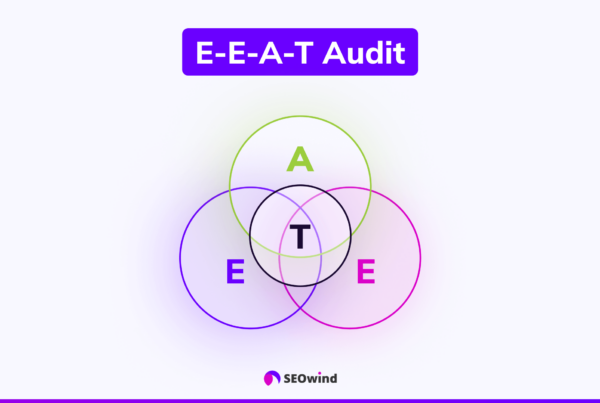Writing has long since transcended the hallowed days of pen and paper. Just as Gutenberg’s printing press revolutionized the world of ink, so has technology transformed writing, this time through Artificial Intelligence (AI). This radical transition offers a fine blend of creativity and scientific precision in content creation, an otherwise human enterprise, leaving everyone intrigued.
So, sit back and buckle up as we embark on this explorative journey into the heartland of AI-powered content creation.
What is AI-Powered Content Creation?
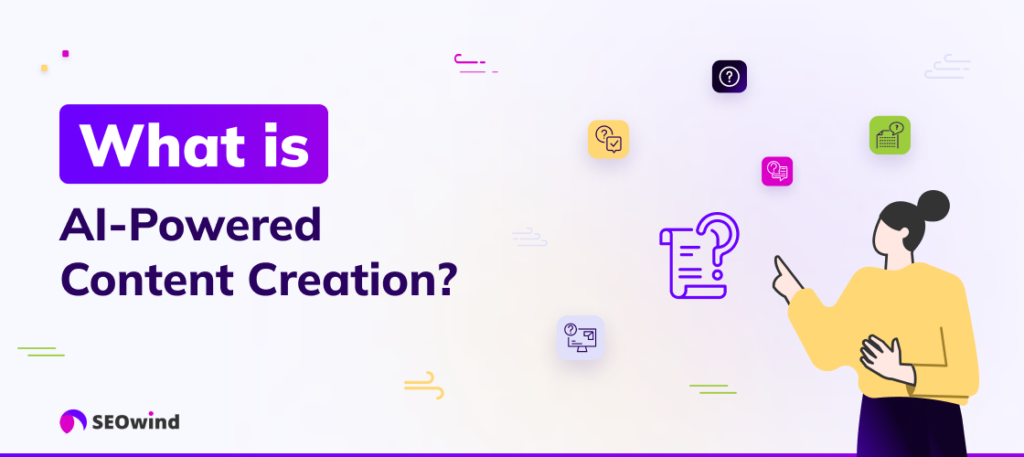
If I may borrow from Arthur C. Clarke’s third law to define AI-powered content creation: “Any sufficiently advanced technology is indistinguishable from magic.”
Rather than relying solely on human intellect to produce written pieces, AI-content generation employs machine learning algorithms. Specifically, it utilizes Natural Language Processing (NLP) models to understand contextually nuanced human language.
In its essence, an AI-powered tool deciphers user intent and then generates sensible text that fits within that given context. If you’ve tried out Google’s autocomplete feature while typing a sentence or speaking to Siri or Alexa, these experiences are just the tip of the Artificial Intelligence iceberg.
Isn’t it fascinating how these digital systems seamlessly mimic our natural conversation style? More than that, they throw fresh light on the infinite potential locked behind the barriers of writer’s block and cranky editorial revisions. It beckons us toward a new reality – AI-driven content creation.
Without a doubt, you can employ AI to generate content. We’re already living in an era where Artificial Intelligence technologies play an integral role in various facets of our lives. Content creation is no exception.
AI can automate content creation, significantly reducing human input while maintaining high-quality standards. This isn’t a futuristic dream anymore. Today, it’s reality. As we delve deeper into this dynamic field, we come across software that leverages AI and its subsets, like machine learning (ML) and natural language processing (NLP). These tools possess the unique ability to learn, adapt, and produce written materials that resonate with a targeted audience.
AI-powered tools such as SEOwind and Grammarly are revolutionizing how we approach content generation. The more data they process, the smarter these machines become at producing engaging content!
To start using AI for content creation, you only need a basic understanding of your target audience’s needs, the messaging you aim to communicate through your text, and access to an AI content creation tool.
You may be wondering whether an AI writer could produce your next novel. Not yet! But when it comes to drafting informative blog posts or social media blurbs for your brand, AI writing tools are already viable. Moreover, I firmly believe that combining human creativity with machine efficiency can inspire works that reflect true innovation in digital publishing.
The enrichment offered by technology through AI-powered content creation has made it possible for computers to assist us and produce compelling narratives autonomously. What these machines can achieve is fascinating when given a set task based on aspects in which they’re trained.
And so I leave you with this question: are you ready to embrace the tide of change brought about by advancements in Artificial Intelligence content creation? Dive into subsequent sections as we explore how businesses use these breakthroughs effectively and ethically!
Benefits of AI-Powered Content Creation
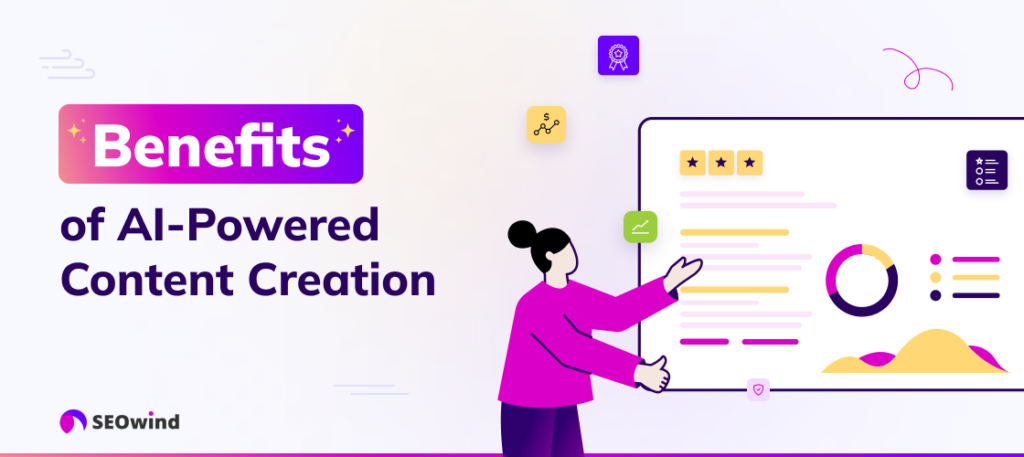
The advent of AI-powered content creation has fundamentally revolutionized the world of digital marketing and communications. With Artificial Intelligence (AI) at its core, this innovative technology is designed to refine your writing process and make your workflow more efficient. Let’s delve into some of the profound benefits stuffed into this digitally enhanced toolbox for writing.
Automating Content Creation
One striking advantage is automating content creation. Just picture how awe-inspiring it would be if you could instruct a program about what kind of article you need, and voila! It quickly serves up well-constructed content. This isn’t mere fantasy anymore; AI empowers us to automate many laborious tasks involved in content creation, making things more straightforward than ever.
Data analysis capabilities
Another attraction of AI-powered tools is their significant data number-crunching capabilities. Say goodbye to manual research and focus instead on drafting compelling narratives while your smart assistant gathers all necessary details swiftly and accurately.
Moreover, spelling errors or awkward sentence constructions do not evade the eagle-eyed scrutiny of these applications. Ensuring top-notch grammar and enhancing coherence throughout your write-ups makes them indispensable to modern-day writing processes.
Saving time
Perhaps most importantly, Artificial Intelligence aids us greatly by saving time, a resource that no amount of money can buy back once spent. The faster one completes quality work using AI assistance in content creation. The more spare hours can be invested fruitfully elsewhere.
Brainstorm new ideas
Remember those moments when creativity seemed elusive? These intelligent tools are also reputed for their ability to spark fresh ideas for topics. Furthermore, by examining patterns based on user searches and preferences, they can help curate personalized content that resonates more strongly with targeted audiences.
Applications of AI-Driven Content Creation
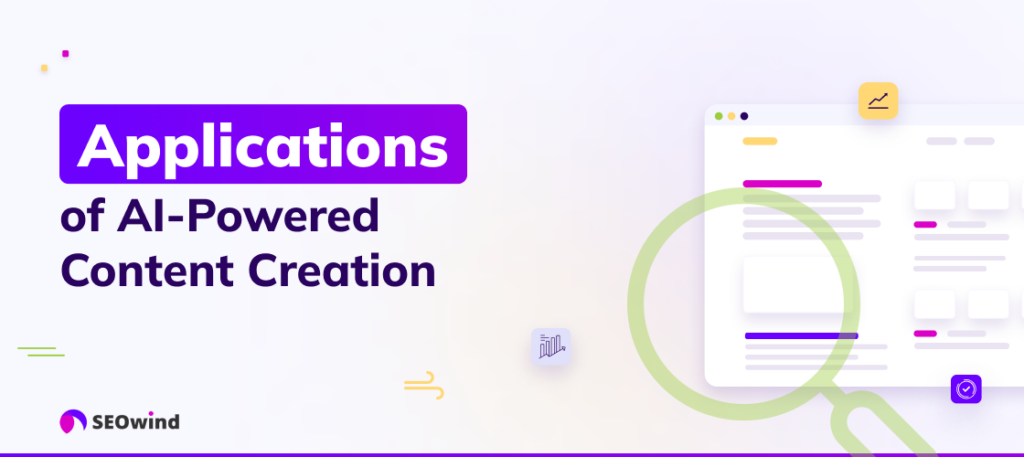
In this continuum of technological advancement, we find burgeoning applications for AI-powered content creation. Everything from formulating a robust content strategy to hastening research can be streamlined effectively and efficiently using artificial intelligence. Let’s embark on this enlightening expedition to explore how AI plays such pivotal roles.
Create an AI-powered content strategy
To begin with, creating an informed and adaptable content strategy is the cornerstone of any successful marketing endeavor. The advent of intelligent algorithms now allows marketers to automate content creation by gauging audience preferences based on their online behavior. These smart tools are designed intuitively enough to anticipate future trends and adapt accordingly.
Such predictive capabilities allow you as a digital marketer or writer to remain agile and consistently deliver fresh, enticing material that resonates with your target demographics. Remember, it’s all about connecting with your audience on a personal level while keeping pace with changing consumption patterns.
Use AI to generate content ideas
Repeatedly conceptualizing unique and engaging content ideas can often prove daunting, even for the most seasoned writers. This is another area in which AI comes in handy, offering fascinating insights into topics that could spark interest among readers.
You can use AI to take on different roles and generate content ideas from their perspective. You will be surprised how insightful the ideas might get.
Create content outlines
Creating content outlines with AI is transforming the world of content creation. AI has advanced to the point that it can generate rich, detailed outlines for content topics across numerous industries. The central part of using AI for this purpose is providing it with the proper context. This strategy involves feeding the AI with information from outlines of already ranking content, thus allowing the AI to understand what kind of structure, key points, depth, and breadth the successful content embodies.
Feeding AI with the outlines of content that is already ranking is crucial. This allows the system to analyze and learn from the best-performing content in terms of SEO rankings, audience engagement, and shareability. This knowledge can then be applied to creating content outlines that are primed to perform well. Thus, by embracing the progress and capabilities of AI, content creators can enhance productivity and improve the potential success of their outcomes.
Write first drafts
Picture this: the outline of your article is ready, the points well-structured, but getting those first few sentences on paper seems like climbing Mt. Everest. Fret not! AI-powered content-creation tools can help kickstart your composition by producing initial drafts.
Known as Automated Writing Assistants (AWA), these variants work based on data inputs about the primary subject matter to generate readable content automatically. This can significantly reduce writing time while preserving a precision-engineered, human-like narrative style for maintaining reader engagement.
Fast-track content research
One cannot overlook the brilliant assistance rendered by AI in swiftly navigating through a haystack of information during those crucial research phases. Instead of sifting tediously through multiple resources for relevant data, intelligent systems featuring advanced search methodologies yield condensed material pertinent to your context.
Automating and accelerating otherwise time-consuming steps, such as keyword research or data mining, with pre-trained models lets you focus on crafting compelling narratives. Simply put, these AI applications become fuss-free filters that ensure you can cherry-pick only the top results!
From idea inception to research completion, each cog in the wheel finds a supportive ally in Artificial Intelligence. By intelligently leveraging these myriad AI-powered content creation applications, we are better equipped to present our readers with nothing short of engaging excellence.
Do keyword research and clustering
One primary application of AI in content creation is its ability to perform keyword research and clustering. Most traditional methods for conducting keyword research are tedious and time-consuming. But with AI-powered tools, this process is automated and, more importantly, optimized.
AI can identify popular keywords related to your topic and rank them based on relevancy, search volume, and competition level. Moreover, it can cluster these keywords into meaningful groups – a task that would otherwise require painstaking manual labor. This ability informs the structure of your newly generated content while ensuring it’s as SEO-friendly as possible.
Optimize content
Another core role of AI in content management is optimizing created content. Doing so makes it easier to reach your audience effectively, and please search engines simultaneously, all without compromising authenticity or engagement.
Using machine learning algorithms, AI can analyze high-performing content within your industry or particular topic area. It then makes informed suggestions regarding the best time to publish posts, the ideal length of articles or blog posts, how to incorporate relevant keywords for better SEO performance, etc.
Streamline the creative review workflow
Creative review processes can quickly become arduous without an efficient method for handling them, especially when a team is involved in building content rather than an individual. Fortunately, we now have ways around that, too!
AI comes in handy here by streamlining workflows across different stages, like brainstorming sessions, draft review, and managing approvals.
AI’s compelling applications offer significant assistance throughout your workflow, from idea conception to hitting the “publish” button! No wonder more businesses adopt such technologies; their strategies thoroughly redefine the sphere by efficiently and effectively generating authentic optimized pieces transparently and ethically.
Who Can Benefit from AI-Powered Content Creation?
Artificial Intelligence is no longer a concept taken from far-off science fiction scenarios. Today, almost anyone can benefit from AI-driven content creation, a technology that helps individuals communicate their ideas more effectively and efficiently.
Marketers
If you’re a marketer, think about the time that gets gobbled up by drafting ad copies or writing product descriptions. It often feels like an eternity, doesn’t it? This is where automated content creation comes in.
- With AI-generated content, creating captivating ad copies becomes a breeze.
- You’ll get help with brainstorming attention-grabbing taglines for your campaigns.
- Consistent in-product messaging and product descriptions that impress even the pickiest shoppers become possible.
Also, personalizing content at scale using traditional methods is labor-intensive. With Artificial Intelligence content creation, personalization efforts are sped up and made incredibly accurate. Now, imagine what this kind of efficiency could do for your ROI!
Writers
Engaging readers is vital for writers — whether they are authors scripting their next bestseller or journalists searching for compelling news angles. But let’s face it: writer’s block creeps up on all of us sometimes.
Well, AI-powered tools might be the answer that banishes those blank-page chills forever:
- An intelligent assistant can help bypass blocks by providing thought-starters or generating outlines.
- Grammatical accuracy and language enhancement maneuvers are simplified using AI-driven suggestions.
- Automate otherwise tedious tasks such as fact-checking and researching to streamline your writing process.
It seems then that embracing AI in writing isn’t just helpful but necessary in today’s fast-paced digital world!
Content Creators
Finally, if you’re a blogger, social media influencer, or YouTuber regularly feeding on fresh ideas, AI for content creation is your knight in shining armor.
- From brainstorming to creating engaging posts or script ideas on the go – it’s all made simple and fast with tools like Grammarly, Quilbot, and Jasper.
- SEO optimization becomes a cinch, empowering your content to reach a wider audience organically.
- Plagiarism checks help maintain originality, ensuring you stand out without being caught up in copycat controversy.
Whether you’re just starting your digital storytelling journey or consistently staying ahead of the curve as an established creator, AI-powered content creation can level up your work while trimming down your to-do list!
Top 5 AI-Powered Content Creation Tools
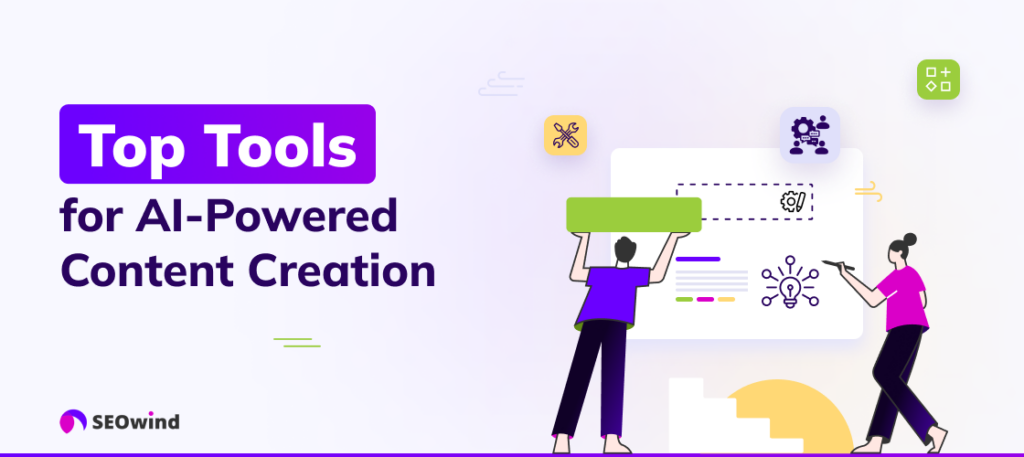
As we journey through the innovative world of AI-driven content creation, let’s explore some tools that make it possible for us to create high-quality content seamlessly and efficiently.
SEOwind – the best AI tool for content creation
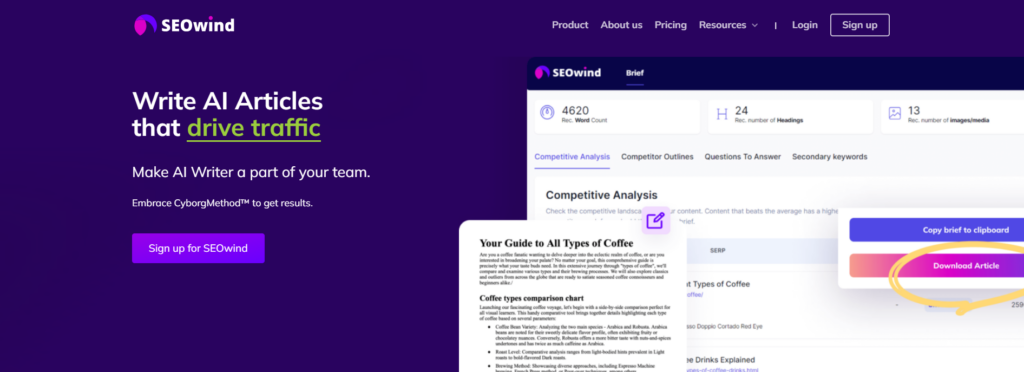
Begin your adventure by trying out SEOwind. Well-known as an incredible platform, it employs AI to manage all web content-related tasks, ranging from idea generation to proofreading. What sets SEOwind apart is its advanced search engine optimization (SEO) capabilities. By utilizing machine learning algorithms, it can suggest valuable keywords and easily optimize your writing for search engines while ensuring readability remains at a stellar level.
The user-friendly interface empowers you with custom prompts based on the desired output and industry context to generate tailor-fit content. If automated content creation is your primary aim, SEOwind has got you covered!
Grammarly
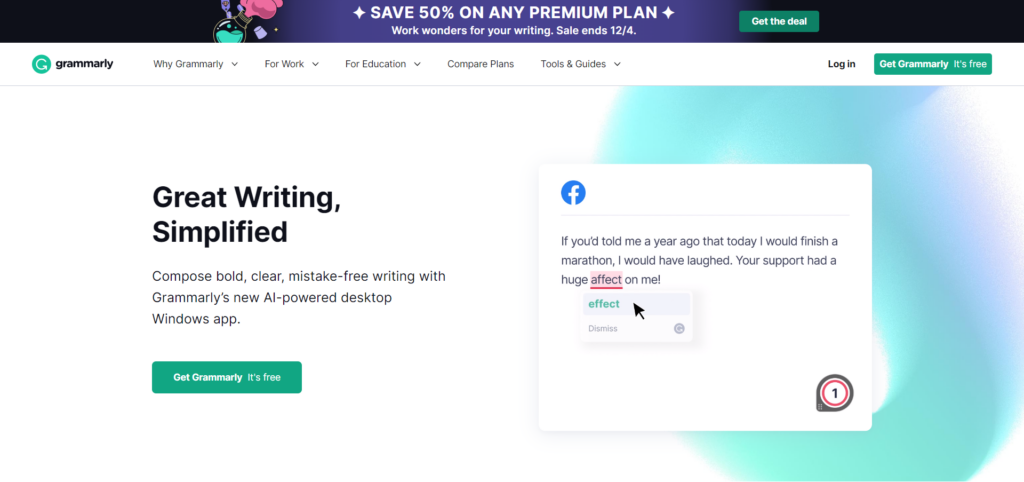
Do spelling errors and punctuation mistakes keep popping up unintentionally? That’s where Grammarly comes into play! While its primary function isn’t necessarily AI-powered content creation per se, this fantastic tool leverages Artificial Intelligence to enhance existing copy.
Grammarly inspects every single word meticulously and suggests grammatical improvements, thus helping to ensure flawless prose. Furthermore, its ability to examine sentences for clarity, engagement, and delivery tone makes this solution almost like a professional editor in pocket-sized form!
Quilbot
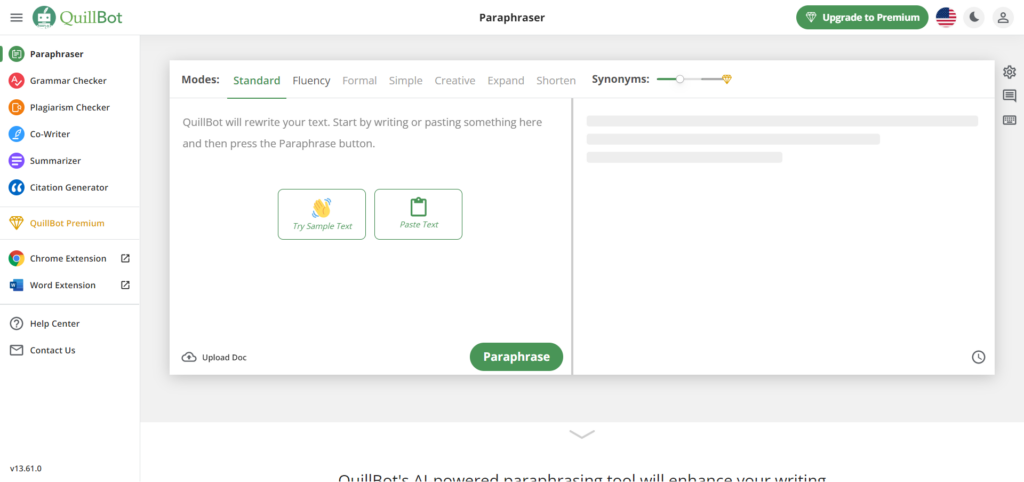
The next stop on our tour of beneficial tools leads us to Quillbot, another AI-assisted writing platform.
Quilbot uses natural language processing technology to help rephrase or paraphrase sections. It can even rework entire articles while preserving the essential context, providing a different perspective on the resonating messages hidden within text strings without compromising their underlying meaning.
Jasper
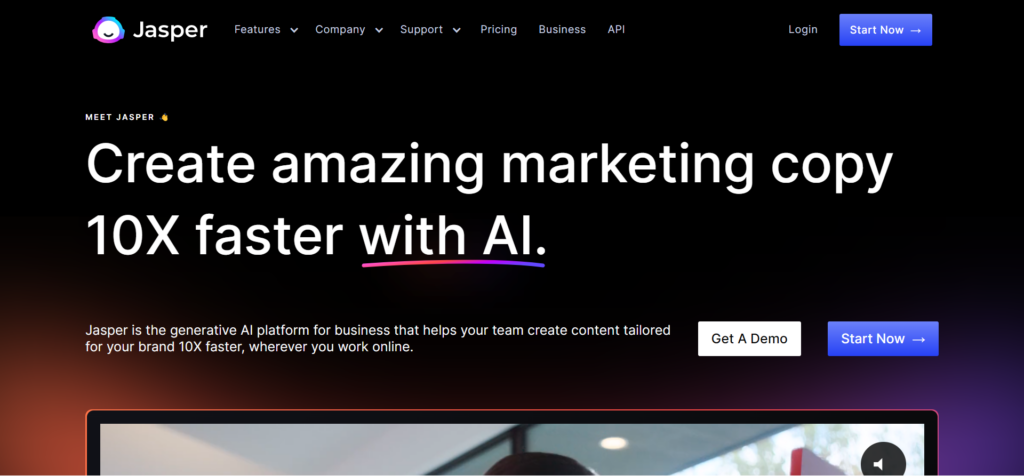
Imagine having an AI writing assistant that can create convincing promotional content, including product descriptions, ad copies or email campaigns, blog posts, and even books. Say hello to Jasper, which does precisely that.
Its prime feature of generating numerous variations based on provided instruction often ignites creative sparks and aids in finding an ideal way to convey your message. If you’re stuck trying to communicate your vision, let Jasper help decode it!
Copy.ai
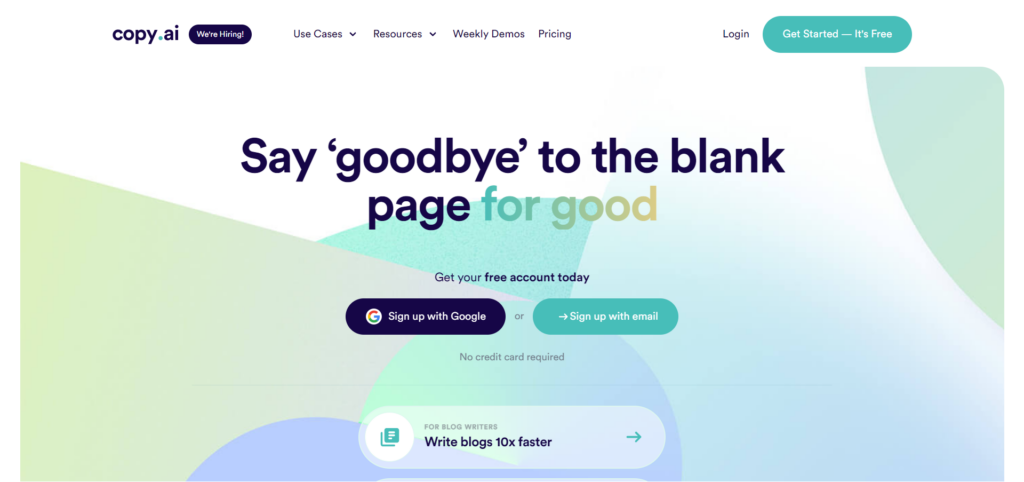
Last but not least, we have Copy.ai, a tool explicitly engineered to draft engaging marketing copy. Whether you need captivating website headers, intriguing social media captions, informative product descriptions, or even persuasive cold emails, Copy.ai holds the power to deliver them all.
Feeding the tool with apt brand information allows it to spin out several iterations in moments, significantly alleviating decision fatigue. My fellow creators and wordsmiths, these are my top picks for Artificial Intelligence tools that will transform how you create content and engage with your audience. Now, it’s time for us to dive deep and advantageously disrupt our processes! Remember this tip: while these tools may be trustworthy assistants, as creators, we still hold responsibility for the final output!
Best Practices for Using AI-Powered Content Creation Tools
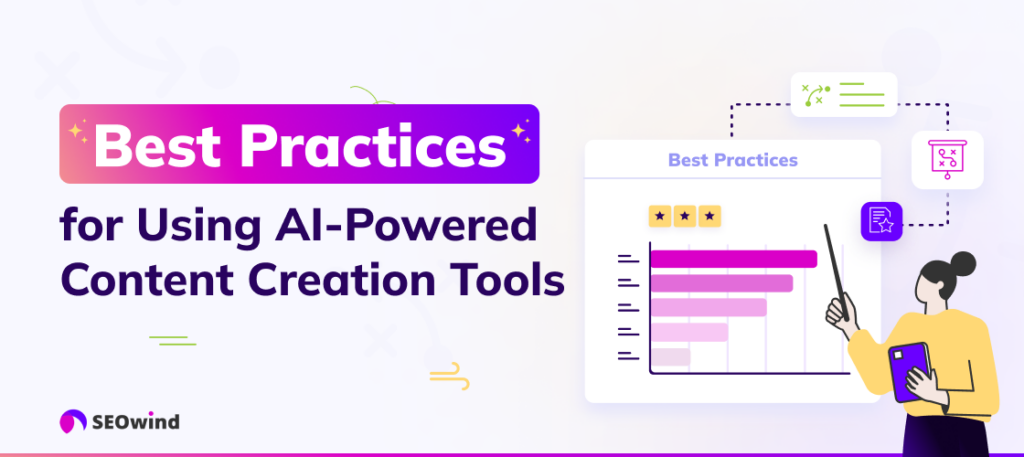
Artificial Intelligence content creation tools are quickly becoming indispensable for many businesses and writers. Through their effective utilization, these innovations can assist in creating high-quality and optimized content. But like any tool, the outcome heavily relies on how adeptly it’s used. Here are some best practices to ensure you’re making the most out of your AI-powered applications.
Feed AI with the Right Context
To begin with, one cornerstone of success is ensuring you feed your AI content creation tool with accurate and comprehensive context. Realize that however intelligent these systems may be, they still hinge on the quality and volume of information given.
Remember, garbage in equals garbage out. So, design a well-structured framework to guide AI algorithms towards desired outputs. Use relevant keywords naturally within text prompts to clarify your topic boundaries effectively. Supplying ample examples or guidance on style and tone enhances their understanding and delivery.
An informed Artificial Intelligence writing tool more reliably produces insightful content that aligns with your goals.
Check For Quality Before Publishing
As impressive as Artificial Intelligence has become in generating human-like copy, it’s essential not to publish its result blindly without a thorough review. The adage “trust but verify” applies perfectly to automated content creation.
AI-generated input can occasionally miss nuances or fail to consider changes in societal perceptions that could inadvertently incite disagreements or controversies. So even though this advanced technology saves significant time, spare a few moments to conduct a final check for relevance, clarity, grammar errors, or potential inaccuracies.
The blend of human intuition with machine efficiency grants you an influential edge over mundane mistakes in content writing.
Don’t Rely Solely On AI-Generated Content
The charm of automated convenience captivates us all. However, due to inherent limitations, relying solely on AI-powered tools for crafting all types of creatives isn’t advisable yet. Artistic content or emotive narratives still require human intervention for authentic touch and emotion.
Deploy AI for tasks like drafting outlines, researching facts, keyword searching, or writing initial drafts. But when a piece warrants emotional depth, creativity, and a unique tone that resonates with readers at intimate levels, human authors remain irreplaceable.
By assigning appropriate roles to humans and machines in the creative process, you can tap into the strengths of both while offsetting their weaknesses. This strategy ensures your AI-powered content creation takes flight without losing the grounded insights only humans possess.
Edit and proofread your drafts
As every good writer knows well, writing is just half the story. The true magic unfolds during the revision process when you fine-tune drafts and eliminate errors.
We’re human, after all, bound to miss straying commas while juggling numerous paragraphs. AI-powered tools, however, showcase an impressive capacity to assist in the editing and proofreading process. They are designed to catch errors that might otherwise slip through the net, helping you avoid embarrassing mistakes and polish your writing so it reads smoothly.
Check for plagiarism and AI content
Plagiarism has become an alarming issue in a digital era where information is just a click away. Ensuring your content’s authenticity serves both to preserve moral ethics and business interests alike while simultaneously avoiding potential Google penalties!
Can Google Detect AI Content Generation?
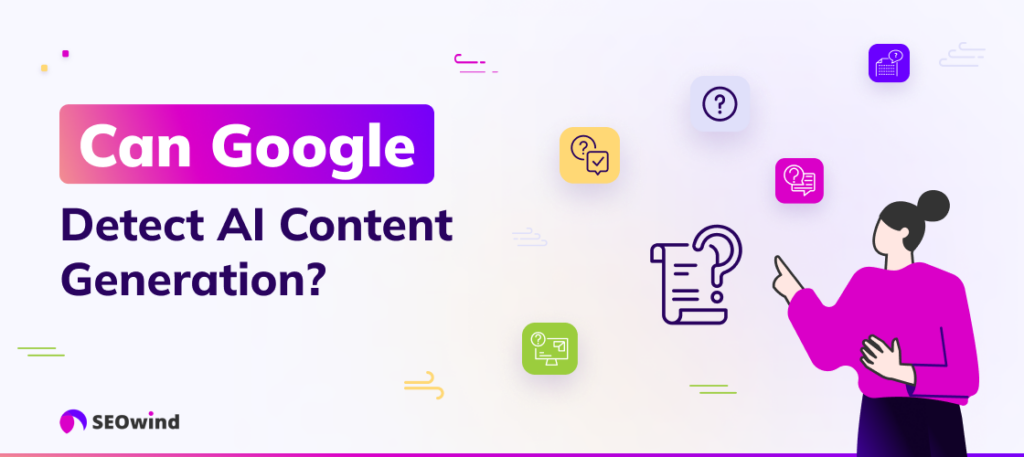
You might wonder whether these sophisticated systems that power the world’s most utilized search engine can detect content generated by Artificial Intelligence. After all, AI-powered content creation is an outstanding technological marvel. It does something that was once solely a human forte. However, it’s more complex than one might assume.
Google’s algorithms are undeniably intricate, continually evolving, and designed to unravel the complexities of digital content. These mechanisms analyze multiple parameters to understand the quality and relevancy of different pieces online. They examine the ease of readability, keyword usage, backlinks, and meta tags, among numerous other factors.
As for detecting AI-created content specifically — it’s a gray area.
While I don’t have any insider information from Google, nor can I point to a definitive study that supports my thoughts, my years in content marketing allow me to make some educated guesses.
Firstly, if the AI in content creation excels at simulating human-like writing patterns – creating well-structured sentences and working seamlessly within a given context – it becomes challenging even for these elaborate algorithms to differentiate between human-written and machine-generated text.
However, tools that create haphazardly written articles could be noticeable due to their unnatural flow and semantic disconnects. Thus, while efficient AI-scripted material could pass unnoticed, poorly construed narratives might get flagged due to a lack of coherence and relevance rather than because they’re auto-generated.
Lastly, but importantly, value proposition matters in today’s SEO landscape! The readers should find your post of genuine interest; it should solve a problem or answer a question. Bearing this primary principle in mind will ensure you consistently generate engaging material with manual effort or advanced AI-powered tools. Remember that quality always triumphs over quantity!
So yes, Google can potentially detect AI-written content. However, it’s not about being flagged but how well you provide value to your readers! That, in the end, is what will set great content apart from the rest. As Microsoft CEO Satya Nadella said: “The true test of AI is when people stop referring to it as just AI.” Is written content there yet? Not quite, but we’re heading in that direction.
Challenges of Using AI for Content Creation
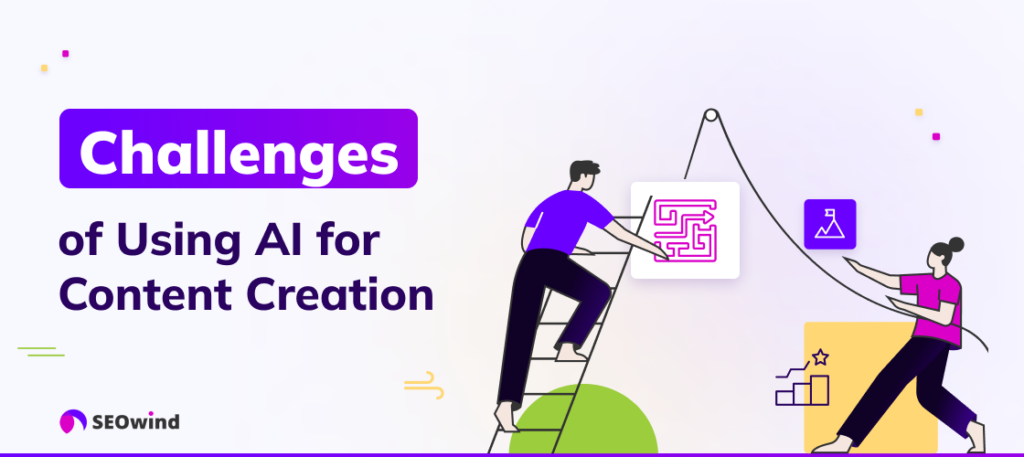
Despite the inherent allure and distinct benefits of employing AI for content creation, some hurdles could make you think twice before leaping to use this innovative technology.
Firstly, it’s paramount to remember that Artificial Intelligence, at its core, operates based on algorithms and lacks inherent creativity. While AI can mimic human writing styles and even master grammar rules perfectly, it doesn’t have a knack for originality. It often fails to grasp context and subtleties in language, which are elements that human writers understand.
In addition, one primary concern is about authenticity. If your blog or business thrives on building a personal connection with your readers or customers through storytelling or anecdotes filled with emotion, be prepared. The current level of AI technology may result in somewhat robotic content because AI simply cannot comprehend human emotions or experiences.
Further adding complexity to using AI-powered tools for content creation is the ethical question surrounding authorship rights. If an AI tool generates content, who owns the copyrights? Is it the AI software developer, or should they remain with the user who inputted data?
Finally, we have to discuss job displacement due to automation. As more tasks get automated, including writing news articles or generating simple reports, will we see less demand for human writers?
While these challenges cast shadows over the utopian future promised by rapid leapfrog advances in tech-driven solutions such as AI-powered content creation, they shouldn’t be viewed as definitive roadblocks but rather obstacles yet to be overcome. After all, every technological advancement brings its own challenges that pave the way for further innovations.
Ethical Considerations of Using AI for Content Creation
The integration of Artificial Intelligence into content creation is indeed a game-changer. But as with any innovation, it introduces some ethical concerns. For one, the thought of AI-generated content replacing human creatives can ignite heated discussions about job security.
And beyond this fear of potential job loss in creative fields, questions arise about transparency and authenticity. When an article or another piece of content is generated by AI, should it be presented as a human’s work?
After all, chaos and randomness are part and parcel of creativity. Human-created content inherently comes with subjective perspectives and an emotional touch. Can automated content creation machines truly replicate these nuances? Or will AI-created content lead to standardized mass production devoid of personal views?
Another critical concern centers around biases within datasets used to train AI-powered tools. These implicit prejudices may infiltrate the created material and perpetuate harmful stereotypes.
Moreover, plagiarism issues must be addressed concerning AI in content creation. Since most machine learning models learn from existing data sources, including copyrighted materials, they might produce similar outputs that inadvertently infringe upon copyright laws.
Dealing responsibly with these ethical considerations necessitates maintaining a delicate balance between leveraging the conveniences of using automation while staying true to principles such as truthfulness, originality, and diversity spoken through unique voices—all key elements deeply intertwined with human-driven storytelling.
As we move forward with embracing AI for content creation:
- We need to strike a healthy balance between man and machine.
- It becomes essential to advance our tools and imbue them with ethical programming technologically.
- Our aim should be fostering symbiosis where we allow technology to aid us without compromising our creativity.
The answer isn’t binary: either human content creators replaced or retained. Instead, integration leverages the strengths of both sides to complement each other.
After all, shouldn’t technology be an extension that enhances our own capabilities rather than a substitution for them?
Future Trends in AI-Powered Content Creation
As the romance between Artificial Intelligence (AI) and content creation deepens, I find it essential to shed light on the future trends shaping this union. After all, changes are brewing; they’re swift and impactful. Let’s take a peek into what lies ahead.
NLP Advancements
In a broader capacity, expect colossal advances in natural language processing (NLP). This AI field focuses on helping machines understand human language, including all of its intricacies. As NLP accelerates, so does our ability to communicate with AI more naturally and intuitively. Consequently, the output from an AI-powered content creation tool will be even closer to what is being penned by flesh-and-blood authors.
Personalization
Every marketer worth their salt craves personalization like there’s no tomorrow because who doesn’t love tailor-made stuff? As machine learning develops, anticipate AI tools that can create personalized narratives unique to each audience subset and even individual users. Imagine your readers feeling that you’ve written solely for them!
Voice and Video
Third up is the voice and video content generation. While it’s not fair to put text content on the backburner just yet, let me break this to you gently: text-based experiences won’t remain unrivaled forever. With video becoming ubiquitous and podcasts basking in glory, soon we’ll see advancements where AI can script engaging videos or draft podcast transcripts at scale.
Real-time content modifications
Perhaps most exciting of all is a real-time content modification based on user interaction data! Imagine how powerful it could become if AI kept tailoring your blog article to the reader’s previous knowledge or interests. Proof indeed that continual learning isn’t limited to humans!
Given these innovations are gearing up as we speak (or read), do bear in mind that jumping on board without looking both ways isn’t prudent. Leverage the technological advancements, but keep them from leveraging you. Be knowledgeable about the capabilities of AI-powered content creation as well as its ethical implications and practical limitations.
While it’s impossible to see what lies ahead in AI-generated content with absolute clarity, one certainty is that change will be ceaseless. Our role? To adapt strategically while keeping the audience in mind. After all, didn’t we venture into this dynamic world of content creation to serve our readers? The future promises excitement, engagement, and efficiency. And I, for one, am clicking my heels! How about you?
Types of AI-Powered Content Creation
As we venture into the world of Artificial Intelligence content creation, it’s essential to grasp the different formats that populate this dynamic field. They leverage their respective strengths, offering unique capacities in crafting or augmenting intellectual work. Think of them as genies with diverse magical powers for your ultimate content mission.
- Natural Language Processing
At the heart of digital wordcraft lies NLP, short for Natural Language Processing. This significant branch of AI analyzes human language, helping machines understand how we communicate and interpret semantics, emotion, context, and intent in the evolving tapestry of content creation AI.
When strolling through the alleyways of automated content creation technology with NLP, you can process large-scale texts and extract what’s meaningful from unstructured data files such as reviews, surveys, or even social media posts.
Imagine having someone who keeps tabs on millions of conversations around your brand or sector to spot trends before they’re headlines!
- Machine Learning
Another star player on our team is Machine Learning (ML). This AI-powered wonder involves algorithms that allow machines to learn from data without explicit instructions. It lays the bedrock for innovation within the realm of AI-powered content creation.
ML learns to predict behavior and automate tasks more accurately as it sifts through vast data patterns over time. For instance, it can identify which topics resonate most with your audience or when is the best time to post new material.
Isn’t having a reliable companion tirelessly learning from past actions and refining strategies based on those insights exciting?
- Automated Writing Assistant
The last members of our lineup are Automated Writing Assistants (AWAs). These synthetic scribes use NLP and ML to go beyond typical grammar checks, assisting users in composing persuasive, clear, and optimized content.
These dedicated sidekicks take care of the time-consuming parts of writing, allowing you to focus on creating engaging narratives. They suggest improvements, predict the next word to enhance flow, and help maintain a consistent tone throughout your work, all while ensuring impeccable grammar and spelling!
The magic of using an AWA transforms any writing activity into a seamless process powered by AI. Consider that even if you’re stuck with writer’s block or rushing to meet a deadline, an Automated Writing Assistant can help you piece together compelling words that engage your readers effectively.
Exploring the dynamic types of AI-driven content generation tools offers an exciting synergy that makes our creative stories come alive. With such awe-inspiring technological wonders at your disposal, diving into AI-powered content creation becomes less daunting and more enchanting.
How Does AI-Powered Content Creation Work?
Understanding the process behind AI-powered content creation removes much of the nebulous aura surrounding this innovative technology. While it may seem convoluted, it’s a step-by-step journey that begins with AI training.
- Train Your AI
Just as human writers learn their skills over time, an Artificial Intelligence system must be trained before producing quality content. This training involves feeding the algorithm large amounts of data, including text from blog posts, articles, and other forms of written content.
Each piece of information is an essential building block in constructing a model by which the AI will generate its own texts. It’s like teaching the software to understand context, including syntax, semantics, and style trends. This is where Machine Learning (ML) plays a key role.
The more comprehensive and diverse the initial data input is, the better results your automated content creation mechanism will yield. Remember, variety is vital when you’re aiming for natural-sounding AI-created content.
- Tell The AI What You Want
After the essential learning period comes instructing your trained AI about what you need it to compose. Let’s say you want a blog post on the benefits of exercise.
You’ll need to give your Artificial Intelligence content creation tool clear directions or prompts regarding keywords (‘exercise,’ ‘fitness regimes’), preferred length (‘1000 words’), and tone (‘conversational’). These instructions function as guidelines identifying the knowledge chunks learned during training that should come into play.
This instructive session falls under Natural Language Processing (NLP), enabling machines to comprehend, interpret, and mimic human language patterns effectively.
- Edit And Polish (And Train Some More)
Now comes the moment of truth: reviewing the AI-generated draft! While AI tools are fantastic at producing content quickly, they may not always hit the nail right on its head in terms of tone or suitability. Therefore, some human intervention is inevitable during this process.
A vital part of using AI for content creation is polishing and perfecting it based on your distinct communication style and audience preferences. Editing goes hand-in-hand with further training. Every modification you make conditions the system to avoid such errors in future tasks.
So, even though an AI tool can generate good quality drafts initially, honing them into great ones steadily enhances machine proficiency over time. While Artificial Intelligence content creation holds immense potential, some craftsmanship will always be there if you want to individualize your brand’s messaging.
Final Thoughts on the Advantages and Disadvantages of AI-Powered Content Creation
The rapid ascent in AI-powered content creation has presented us with a toolbox brimming with extraordinary tools we can use to scale our content production process. To journey towards this promising horizon, it’s worth taking stock of an array of opportunities, advantages, and disadvantages.
The Advantages
Simplicity is one merit tied to AI-powered content creation. Imagine riding on a magic carpet that whisks you over laborious processes such as ideation. That’s precisely where AI shines! It streamlines workflows and disentangles complexities linked to idea generation.
Consistency follows right behind simplicity. Churning out high-quality writing daily may prove challenging for even the most seasoned wordsmiths. Enter AI: your secret weapon ensuring continuous uniform quality without burning out!
Having listed the benefits of automation and consistency, let’s add efficiency to the mix. Time often becomes scarce when creating engaging narratives, especially under looming deadlines. No more enduring sleepless nights or swigging endless cups of coffee with AI on board.
The Disadvantages
Naturally, every rose has its thorns, and automated content creation is no exception to this rule. Despite posing as a savior from fatigue-inducing procedures, lack of authenticity becomes the first prickly disadvantage of this tech revolution. Where empathy breathes life into stories to make them relatable, auto-generated pieces sometimes fail to ignite that spark due to their robotic tones.
This leads us to another crucial shortcoming: limitations in creativity.
Finally, susceptibility to errors hampers AI-content creations’ credibility; observing grammar rules and spell-checking doesn’t necessarily translate to error-free documents. Context and idiomatic language pose potential pitfalls for AI systems.
In conclusion, marrying these advantages and disadvantages offers a balanced perception of AI in content creation. It’s imperative to remember that while it possesses transformative power, human oversight remains indispensable! The future of content creation promises an exciting landscape enriched by the unification of Artificial Intelligence and human ingenuity. Happy creating!
